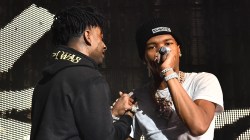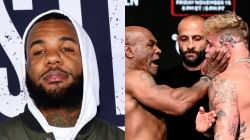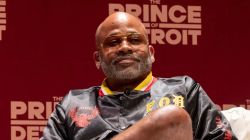To the attentiveness of a tripod-mounted camcorder and a print-Web content reporter’s pocket sized notebook, Goodie Mob mic-controller Cee-Lo Green flops into a chair and props his feet on an ottoman both upholstered with a thickly padded fabric in the green room of the Isaac Hayes Music-Food-Passion club in the glitzy North Loop section of downtown Chicago. After delivering a riveting 30-minute set with his band Electric Sex for a tour promoting his debut solo album, ‘Cee-Lo Green And His Perfect Imperfections‘ (Arista) and visiting with a very bearded and flowerchild-looking Common near in the club’s sound booth a day before that Chicago born and bred Brooklynite tours Africa, the most animated of Goodie’s foursome arrives true to his schedule-on Colored People’s Time. The plates of virtually devoured soul food scattered about similar chairs and ottomans forming a boundary between the cattle call of VJ shows and a scant handful of print and Web media, especially the china topped with halves and corners of cornmeal muffins, suggest that Isaac Hayes’ kitchen has thoroughly pleased the Southwest Atlanta tastes of Cee-Lo and his band.
Although much hoopla is made about the album and the stylishly blaxploitative music video for its first single “Closet Freak,” the real story is Cee-Lo’s uninhibited live performance without his Goodie kinsmen T-Mo, Khudjo, and Gipp. Not that Cee-Lo doesn’t come off as a mic-controller possessed while juggling the tasks of laying far-reaching soul dialectic on the crowd and making it gyrate to his flow. It’s just that by his lonesome, the joy of it all pours out of him like converging brooks freed by a spring thaw.
“Let’s see, if I could go back to in time [to one era], I think it would be back in the psychedelic ’60s with the hippies,” Cee-Lo says in reply to one of those more sophisticated variations of Oprah and Barbara Walters’ psychoanalytical quizzing. “Yeah, I’d be a black flower child.”
If the sight of golden-skinned Cee-Lo in sandals, bell bottoms, a dashiki, and a blown-out Afro strewn with daisies sounds out of character, think of his very apparent passion for retro-mod gear recalling the garish fashion statements of rock and funk’s infant glam periods. Better yet, consider the layers of muses that compose his hip-hop variation of most southern shortcake-the Clark Sisters’ crossover gospel inspired by a Mahalia Jackson; Gil-Scott Heron’s seething liberation poetry; Temptations-style doo wop, the narcotic social commentary of Peter Tosh and Jimmy Cliff’s reggae, the tone poetry in Jimi Hendrix’s acid funk guitar; the sheer funk of James Brown, Clinton, Bootsy Collins, and Sly And The Family Stone; Curtis Mayfield’s bigger-than-life blaxploitation soundscapes; the sheer soul of Al Green, Marvin Gaye, Bill Withers, and Frankie Beverly and Maze; and any historically black college or university’s marching band, such as those that compose the Atlanta University Center complex in his part of the Empire City of the South.

AD LOADING...
“I don’t discriminate in music,” Cee-Lo says, also acknowledging influences from the likes of Sade, Roy Ayers, and Portishead. “Southern music is still grounded in southern funk and blues. [His crew] Dungeon Family is the closest thing to that, even though I don’t consider it one kind of sound. I think we just do good music.”
Albeit that he’s on an every-urban thing with his solo sound, Cee-Lo artistically follows Collins’ subtilely political funk standards of a chain reaction where unchained minds beget liberated butts. Never has that afrocentric take on Descartes’ “I think, therefore I am” philosophy been so relevant at a time when a president has been elected by a U.S. Supreme Court with divided political agendas instead of an electoral college rubberstamping the popular vote and when the nation is experiencing a resurgence of hysteria against racial equality that made Cee-Lo’s black music foreparents Paul Robeson and Josephine Baker aliens in their native land after the Soviet Union triggered the arms race by detonating its own atomic and hydrogen bombs.
“It must be completely revolutionary,” Cee-Lo says, explaining where he feels that hip-hop’s direction must be in the next five years. “Nobody’s familiar with McCarthyism [the U.S. policy of witch hunting during the late ’40s and much of the ’50s that damaged or destroyed the lives of many U.S. performers, writers, directors, and producers accused of harboring Communist sympathies, without compelling evidence in many cases] and the Cold War. Educating people about that wouldn’t even be my first concern. We have to regain knowledge to first learn who you are morally and historically, especially now that Bush wants to be a people’s president.”



